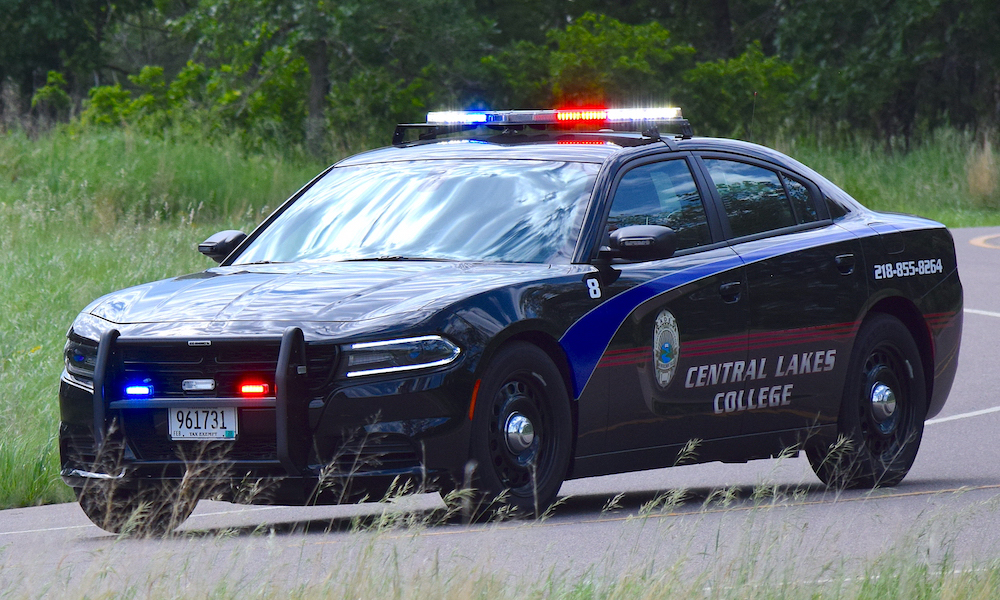Career Description
With the Peace Officer/Public Safety Transfer Pathway A.S. degree, you can pursue careers in areas such as Minnesota peace officer, deputy, state patrol, conservation officer, or corrections officer.
Program Information
The Peace Officer/Public Safety Transfer Pathway offers students a direct route to becoming a licensed peace officer. This Associate of Science degree provides the necessary coursework for licensure as a peace officer, preparing graduates for careers in law enforcement. Additionally, the program is designed for students interested in continuing their education, as all course credits transfer seamlessly to designated Law Enforcement bachelor’s degree programs at Minnesota State universities. Students who complete this pathway and transfer to one of the seven Minnesota State universities will enter with junior-year status, ensuring that all courses apply directly to their bachelor’s degree in a related field. Minnesota State universities accepting these transfer credits include Bemidji State University, Metropolitan State University, Minnesota State University Mankato, Minnesota State University Moorhead, Southwest Minnesota State University, St. Cloud State University, and Winona State University.
Program Outcomes
Graduates will be able to:
- Demonstrate knowledge of structure, process and relationships between law enforcement, the courts and correctional systems;
- Process crime scenes from preliminary stage through disposition;
- Function in a multicultural society as a mature, adaptable citizen, while meeting the needs and challenges of clients and communities;
- Interpret and apply theory, law, policy and practice as it relates to juvenile delinquency and deviant behavior;
- Demonstrate an understanding of the roles of the legislative, judicial and executive branches and how they relate to criminal law;
- Apply knowledge of criminal law, constitutional law and Minnesota traffic code;
- Demonstrate strong and effective written and oral communication skills; and
- Understand the importance of ethics and ethical behavior in law enforcement.
Special Program Requirements
In addition to the program requirements, students must meet the following conditions in order to graduate:
- Students must achieve a grade of “C” or higher in all courses required in the program;
- College Cumulative GPA Requirement: cumulative grade point average (GPA) of credits attempted and completed at CLC must be at least 2.0;
- College Technical Core GPA Requirement: cumulative GPA of credits attempted and completed towards the technical core of the diploma or degree must be at least 2.0;
- Residency Requirement: students must complete 25% of their credits at Central Lakes College;
- Courses required for Minnesota P.O.S.T. licensing must be completed within three (3) years of starting the certificate;
- Students must have a valid Emergency Medical Responder certification (or higher) at the time of the Post Board Exam.
Admissions
- Students must complete and pass a background check and Minnesota Multiphasic Personality Inventory (MMPI) with a psychologist approved by the Program Coordinator prior to being officially admitted into the program. The background check and MMPI will be completed during the first week of classes.
Please see the Criminal Justice Coordinator for further information.
Employment Statistics
For more information regarding employment statistics, career salary information and estimated job growth, follow the resource links below:
https://apps.deed.state.mn.us/lmi/ces/
http://www.bls.gov/ooh/home.htm
Salary information from indeed.com

Program Course Requirements
Required Discipline Courses (36 credits)
CRJU 1112 Peace Officers and the Community, 3 cr
CRJU 2101 Criminal Law, 3 cr
CRJU 2102* Criminal Procedures, 4 cr
CRJU 2106 Fitness for Minnesota Peace Officers, 2 cr
CRJU 2108 Criminal Investigations, 3 cr
CRJU 2114 Traffic Law, 3 cr
CRJU 2140 Behavioral Science for Peace Officers, 3 cr
CRJU 2160* Use of Force, 2 cr
CRJU 2162* Firearms, 3 cr
CRJU 2164* Patrol Practicals, 5 cr
CRJU 2166* Tactical Communications/Relations, 2 cr
EMTS 1124 Emergency Medical Responder OR
Copy of EMR Certificate AND CRJU Elective, 3 cr
Required MnTC Courses (32 credits)
COMM 2420 Intercultural Communication (Goals 1,7A,7B) OR
COMM 2422* Honors Intercultural Communication (Goals 1,7A,7B), 3 cr
CRJU 1401 Criminal Justice (Goal 9), 3 cr
CRJU 1404 Juvenile Justice (Goal 9), 3 cr
ENGL 1410* Composition I (Goal 1) OR
ENGL 1420* Honors Composition I (Goal 1), 4 cr
ENGL 1411* Composition II (Goal 1) OR
ENGL 1421* Honors Composition II (Goals 1,9), 4 cr
PHIL 2420 Ethics (Goals 6,9) OR
PHIL 2421* Honors Ethics (Goals 6,9), 3 cr
PSYC 2441 Social Psychology (Goals 5,7A), 3 cr
SOCL 2405 Criminology (Goal 5) 3 cr
SOCL 2481 Race, Ethnicity and Oppression (Goals 5,7B), 3 cr
Goal 4 – Math/Logical Reasoning, 3 cr
*Denotes prerequisites
GRADUATION REQUIREMENT – 68 CREDITS
Program Instructors
| Photo | First Name | Last Name | Position | Department | Phone | Alt. Phone: | URL | wdt_ID | Details | |
|---|---|---|---|---|---|---|---|---|---|---|
 |
Aubrey | Beadell | Advisor | TRIOStudentSupportServices | (218) 855-8014 | aubrey.beadell@clcmn.edu | 1 | More details | ||
 |
Nick | O'Reilly | Occupational Skills Program College Lab Assistant | OccupationalSkills | 218-855-8077 | Nicholas.oreilly@clcmn.edu | 2 | More details | ||
 |
Kevin | Lomax | Automotive Lab Assistant | Automotive Faculty | 218-855-8000 | KLomax@clcmn.edu | 3 | More details | ||
 |
Jody | Flynn | Accessibility Services Assistant | Accessibility | 218-855-8056 | jody.flynn@clcmn.edu | 5 | More details | ||
 |
Deana | Bobzien | Instructor | CollegeCareerStudies - Mathematics - Supportive Services | 218-855-8339 | deana.bobzien@clcmn.edu | 7 | More details | ||
 |
Brianna | Rajkowski | Advisor | TRIOStudentSupportServices | 218-855-8228 | brianna.rajkowski@clcmn.edu | 8 | More details | ||
 |
Tajia | Anderson | PSEO Specialist | Admissions - CollegeCreditInHighSchool- PSEO | (218) 855-8079 | tajia.anderson@clcmn.edu | 10 | More details | ||
 |
David | Gray | Instructor | History | 218-855-8189 | david.gray@clcmn.edu | 14 | More details | ||
 |
Jim | Nagy | Adjunct Instructor | GraphicDesign | 218-855-8157 | james.nagy@clcmn.edu | 15 | More details | ||
 |
Brandon | Schneider | Instructor | HeavyEquipment | 218-894-5179 | brandon.schneider@clcmn.edu | 16 | More details | ||
 |
Natalia | DePauw | Director of Dual Enrollment | PSEO - CollegeCreditInHighSchool - Advising | 218-855-8263 | natalia.depauw@clcmn.edu | 18 | More details | ||
| Amy | Disterhaupt | Admissions Specialist | Admissions | 218-855-8250 | amy.disterhaupt@clcmn.edu | 20 | More details | |||
 |
Nick | Heisserer | Dean of Brainerd Career & Technical Programs | Administration | 218-855-8067 | nick.heisserer@clcmn.edu | 21 | More details | ||
 |
Matthew | Krueger | Environmental Health and Safety Officer | Maintenance - Security - Safety | 218-855-8115 | matthew.krueger@clcmn.edu | 22 | More details | ||
 |
Mark | Lindquist | Instructor | Music | 218-855-8203 | mark.lindquist@clcmn.edu | 23 | More details | ||
 |
Jeremy | Goddard | Bookstore/Print Shop | Bookstore Supportive Services | 218-855-8146 | Jeremy.Goddard@clcmn.edu | 25 | More details | ||
 |
Sarah | Jennissen | Instructor | PracticalNursing | 218-894-5308 | sarah.jennissen@clcmn.edu | 26 | More details | ||
 |
Cash | Robinson | Academic Advisor | TRIOUpwardBound - Advising | 218-855-8035 | cash.robinson@clcmn.edu | 28 | More details | ||
 |
Ryan | Wright | Enrollment Representative | Admissions - CampusTours | 218-855-8013 | ryan.wright@clcmn.edu | 31 | More details | ||
 |
Steve | Wenzel | Instructor | PoliticalScience | 218-855-8073 | stephen.wenzel@clcmn.edu | 32 | More details | ||
 |
Julie | Woitalla | Instructor | NursingASDegree - PracticalNursing | 218-855-8168 | julie.woitalla@clcmn.edu | 33 | More details | ||
 |
Josh | Zaborowski | Upward Bound Advisor | TRIOUpwardBound - Assessment | 218-855-8032 | joshua.zaborowski@clcmn.edu | 35 | More details | ||
 |
Paul | Zimmerman | Instructor | Diesel Faculty | 218-894-5143 | paul.zimmerman@clcmn.edu | 36 | More details | ||
 |
Ed | Uhlenkamp | Instructor | FarmBusinessManagement | 218-894-5160 | edward.uhlenkamp@clcmn.edu | https://dynamicforms.ngwebsolutions.com/ShowForm.aspx?RequestedDynamicFormTemplate=32c40b45-028c-46d6-9f79-9c1edc503713 | 38 | More details | |
 |
James | Velde | Instructor | FarmBusinessManagement | 218-234-3981 | james.velde@clcmn.edu | https://dynamicforms.ngwebsolutions.com/ShowForm.aspx?RequestedDynamicFormTemplate=cff3bff4-005f-4f5c-82a8-4c6aed02c8e9 | 39 | More details |
Photo:
First Name:
Last Name:
Position:
Phone:
Email:
